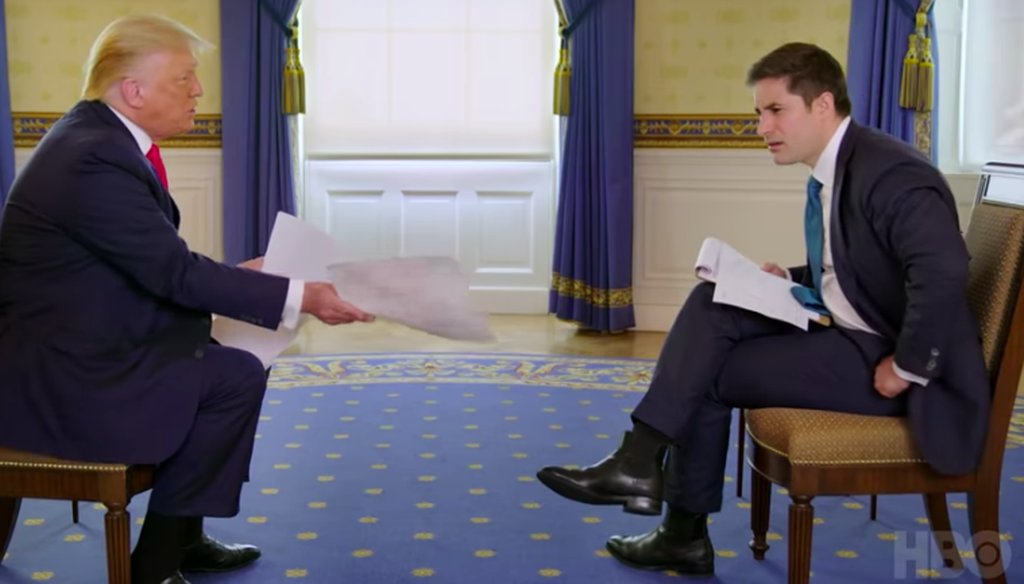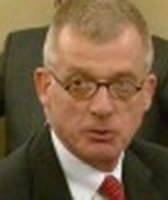Stand up for the facts!
Our only agenda is to publish the truth so you can be an informed participant in democracy.
We need your help.
I would like to contribute

President Donald Trump is interviewed July 28, 2020. (HBO/Axios)
In a rare sit-down interview at the White House, President Donald Trump repeated a slew of misleading claims aimed at painting a rosy picture of the United States’ coronavirus response.
During the nearly 40-minute one-on-one, which Axios filmed on July 28 and aired on HBO Aug. 3, political reporter Jonathan Swan quizzed the president about several of the issues that have defined the past six months. Among them: why the president has suggested he won’t accept the outcome of the election, whether Trump knew about reports of Russian bounties on American soldiers and why the coronavirus death rate is on the rise.
"Right now, I think it’s under control," Trump said, referring to the pandemic.
"How? 1,000 Americans are dying a day," Swan asked.
"They are dying — that’s true. And it is what it is," Trump responded. "But that doesn’t mean we aren’t doing everything we can. It’s under control as much as you can control it."
Trump’s comments contained a mix of half-truths, missing context and outright falsehoods. We fact-checked several of the most questionable claims below.
"Before the pandemic, they had the worst year, China, that they’d had in 67 years."
This is misleading. We rated a similar claim Mostly False.
Prior to the coronavirus outbreak, China’s economy was slumping. But 67 years ago, the country was on the cusp of a massive famine brought on by Mao Zedong’s economic policies that historians say killed as many as 45 million people.
It’s not accurate to say that today’s China is just as bad. For a number of years during the 1960s and ‘70s, the economy was in far worse shape than it is now, according to data from the World Bank.
In 2019, China’s economy grew at its slowest rate in 29 — not 57 — years.
— Daniel Funke
At Trump’s Tulsa rally "we had 12,000 people, not 6,000, which you reported and other people reported."
Trump doubled the official count. Arena officials, who scanned tickets of people entering Trump’s June 20 rally, said the crowd totaled around 6,200.
Multiple media outlets including Axios reported that Tulsa fire department spokesman Andrew Little said the crowd size was fewer than 6,200. That count did not include staff, suites and media at the 19,200-capacity BOK Center.
We spoke to Little on Aug. 4, and he told us that the fire department did not come up with the crowd size on its own. Little said that the number came from the BOK Center based on the scanned tickets of participants entering the center.
"That number was not tallied by us," Little told PolitiFact. "It was relayed by us with approval by the venue."
Trump campaign communications director Tim Murtaugh disputed the 6,200 figure the day after the rally saying, "12,000 people went through the metal detectors so that number is way off."
— Amy Sherman
"We have tested more people than any other country."
This is incomplete. The U.S. has conducted more COVID-19 tests than any other country in sheer numbers, but that metric doesn’t tell the full story, Johns Hopkins data shows.
Testing programs should be scaled to the size of the epidemic, not the size of the population, according to Johns Hopkins. Several countries effectively controlled the spread of the virus through testing programs that had a far lower number of tests per capita than the U.S.
"Meanwhile, despite having the highest rate of tests per capita, the U.S. faces the largest outbreak in the world, and new cases continue to trend upwards in many states," Johns Hopkins wrote "Looking at the positivity rate (i.e., out of all tests conducted, how many came back positive for COVID-19) is the most reliable way to determine if a government is testing enough."
— Amy Sherman
"You can test too much, read the manuals… read the books."
We found no evidence for this. It isn’t clear what "manuals" and "books" the president is referring to.
"We have a much bigger epidemic, so you have to test more proportionately," said Jennifer Kates, a senior vice president at the Kaiser Family Foundation.
Scientists and both political parties agreed early in the pandemic that testing must be expanded to track how the virus spreads and to make sure sick people without symptoms quarantine. Currently, increased testing is recommended by the CDC to help people safely return to work and schools.
There have been calls to "test smarter," by only testing people with symptoms and essential workers.
Michael Hochman, associate professor at the Keck School of Medicine at USC, wrote an article that highlighted how expensive testing is and how false negatives could give people a false sense of security. Hochman argued that expanded testing should target specific populations for testing and the government should be promoting social distancing and masks for people at lower risk.
— Emily Venezky
"You don’t know" that South Korea had 300 deaths, "and they have spikes."
This is misleading and mostly inaccurate. According to multiple COVID-19 tracking websites South Korea has had only 301 deaths, and the tally was at 300 when Trump was interviewed July 28. South Korea, with a population of more than 51 million, hasn’t recorded more than five deaths on a single day since April. South Korea also hasn’t had a spike of more than 200 daily cases since the end of March.
South Korea’s numbers reflect their large and early response to COVID-19. They were carrying out testing at a higher rate, with more than 55,000 tests by the end of February, and used contact tracing to quarantine people exposed to the virus.
— Emily Venezky
"Because we do more tests, we have more cases."
This is incorrect.
The clearest view of how the coronavirus is spreading is through the lens of the percentage of coronavirus tests that come back positive. If more tests are being conducted and more of them are coming back positive, that means that the virus is spreading beyond just the increase in testing.
Between April and June, testing went up significantly and the share of positive results went down. But in June, the share of positive tests climbed. While it has leveled off and eased a bit, it is still more than three percentage points higher than in the spring.
And of course, cases occur whether or not someone tests for the virus.
— Jon Greenberg and Louis Jacobson
"Death is way down from where it was … It spiked, but now it's going down again. It's going down in Arizona. It's going down in Florida. It's going down in Texas."
This is wrong in several ways. On the day before the Trump interview, the 7-day average death toll nationally had been climbing for weeks, according to the Covid Tracking Project. It stood at 1,004. A week before that, it had been about 800. A week before that, it had been about 700.
For the states Trump mentioned, he was wrong about Texas (the 7-day average was clearly rising), he was wrong about Florida (the average was about 10 higher than a week before, although it had dropped by three from a couple of days before the interview) and correct about Arizona (the rolling average was three deaths lower than a week before).
— Jon Greenberg
(Reports that Russia paid bounties or offered to pay bounties to Taliban-linked militants to kill American soldiers) "never reached my desk."
This lacks context. Warnings that a Russian intelligence unit placed bounties on American forces appeared in the President’s Daily Brief, according to multiple news reports. The President's Daily Brief is a summary of high-level information and analysis on national security issues, prepared daily for the president and other designated members of his administration.
The White House has said Trump was never orally briefed.
Trump has not condemned or warned Russia over the information reported by the New York Times — because he has said the reporting isn’t credible.
— Miriam Valverde
"We’re largely out of Afghanistan."
As Swan pointed out in the interview, that’s not right. There’s almost the same amount of U.S. troops in Afghanistan now as there were when Trump took office.
At the time of Trump’s inauguration, there were roughly 8,400 U.S. troops in Afghanistan.
Currently, there’s about 8,600 troops remaining in the country.
The number ballooned to around 14,000 at one point in Trump’s term, but has declined over the last several months.
— Samantha Putterman
"We’ve wiped out ISIS. We took out ISIS, 100% of the caliphate."
This needs additional context. ISIS is much weaker now than when Trump came into office, and experts tell us he deserves some credit for applying more resources to the fight. But the strategy he used was largely inherited from the Obama administration, and ISIS is still operating in some areas.
Will Todman, an associate fellow in the Middle East Program at the Center for Strategic and International Studies, said the group is significantly weaker, but continues to operate as an insurgency in Iraq and Syria, where it conducted at least 600 attacks from January to May 2020, showing that it remains a serious threat.
"Many of the economic, political and social factors that motivated the rise of the terrorist group remain or have even worsened. ISIS has also expanded its influence in other areas, including in Africa and Central Asia, and so the focus is shifting," Todman previously told PolitiFact. "However, ISIS controls no territory in Iraq or Syria, and its capabilities are nothing in comparison to what they were at the height of their 'caliphate' or when President Trump took office."
— Samantha Putterman
"They’re going to send tens of millions of ballots to California, all over the place."
This is misleading. Around 20 million people are registered to vote in California, but the statement mimics false claims he's made about California sending out ballots to "anyone living in the state, no matter who they are," falsely calling the election rigged.
In May, California Gov. Gavin Newsom, a Democrat, ordered all counties to send out mail-in ballots, citing health concerns amid COVID-19. But a review of Newsom’s executive order shows only registered voters would receive vote-by-mail ballots, not to anyone "all over the place."
To register to vote in California, residents must be 18, U.S. citizens, not in state or federal prison or on parole for the conviction of a felony, and not declared mentally incompetent to vote by a court.
— Samantha Putterman
"Millions of ballots going, nobody even knows where they’re going."
This is wrong. There’s no evidence that states are randomly mailing millions of ballots without any idea where they’re going.
Most states require voters to apply for mail-in ballots, according to election law experts, with exceptions for states that already primarily vote by mail, and California, which plans to mail ballots to voters because of the COVID-19 pandemic.
— Samantha Putterman
"You look at some of the corruption having to do with universal mail-in voting. Absentee voting is OK. You have to apply, you have to go through a process. Absentee voting is good."
This is a misleading accusation and a false distinction. There is no objective difference between absentee voting and voting by mail.
In the states that allow broad use of mail ballots, there is no distinction in how a voter requests "absentee" ballots and other types of mail ballots. All mail ballots, regardless of how they are requested, are treated the same once they’re cast. They all require verification before being counted.
Election experts across the country have said that fraudulent mail-in voting is exceedingly rare.
The Brennan Center for Justice, a non-partisan law and public policy institute, found that Oregon – a state that votes primarily by mail – has sent out more than 100 million mail-in ballots since 2000, but has documented only about a dozen cases of proven fraud.
— Samantha Putterman
"You could have a case where this election won’t be decided on the evening of Nov. 3."
This is likely. Amid the coronavirus pandemic, many states are encouraging citizens to vote by mail. Ballots cast by mail require extra steps to verify a voter’s identity, such as comparing signatures. Counting votes received by mail also involve a more time-consuming process, including the opening of envelopes and sorting.
Election administrators have been pushing for laws that would allow them to start the voter verification process before election night. Many states allow this, as long as the ballots are not counted and the totals are not released until after the polls close.
— Amy Sherman, Louis Jacobson
Speaking of Ghislaine Maxwell and Jeffrey Epstein, "Her boyfriend died in jail and people are still trying to figure out how did it happened, was it suicide, was he killed."
Epstein, a convicted sex offender who was charged with sex trafficking, was found dead in August 2019 while in federal custody. Epstein’s death has fueled many unsubstantiated conspiracy theories. The Justice Department in August said the circumstances of Epstein’s death were under investigation.
The New York City Medical Examiner's Office determined Epstein's death a suicide, but a forensic pathologist hired by Epstein’s brother disputed that finding.
Maxwell, Epstein’s former girlfriend, was arrested in July on charges she lured girls to be sexually abused by Epstein.
— Miriam Valverde
Asked about "the disturbing footage of people in fatigues beating the Navy veteran" in Portland, Ore. Trump: "No, no, no, no, no, no, no, no. Here you go, the fake news."
It’s not a hoax that a Navy veteran was beaten with a baton by a federal officer, while another officer sprayed him with a chemical irritant. That incident was captured in a July video taken by Portland Tribune reporter Zane Sparling.
Multiple news outlets reported that Christopher J. David, a Navy veteran, went to downtown Portland in late July to ask federal officers about their tactics in the city. David said he felt compelled to act after watching videos of unidentified federal officers picking up protesters off the streets and throwing them into unmarked vans.
The Justice Department Inspector General has opened an investigation into use of force allegations involving department personnel in Portland in July.
— Miriam Valverde
"Actually, (the violence in Portland) is getting better (since federal agents went in). We’ve arrested a lot of people."
This is disputed by local and state officials in the area.
The federal agents in Portland are now being phased out of the city due to a July 29 agreement between Oregon Gov. Kate Brown and the Trump administration.
Before that, Portland Mayor Ted Wheeler said in mid-July that their presence was "sharply escalating the situation."
"Their presence here is actually leading to more violence and more vandalism," Wheeler told CNN’s Jake Tapper. "And it's not helping the situation at all."
State officials made similar comments in mid-July. Brown said the federal agents had "substantially escalated the situation" and were "adding gasoline to a fire."
Oregon Attorney General Ellen Rosenblum, who filed a lawsuit against the federal agencies involved, said their presence created "a more volatile situation on our streets."
As the federal presence has diminished in recent days, the protests have remained largely peaceful, according to multiple news reports. The Department of Homeland Security, in an Aug. 3 press release, noted "an overall trend of diminishing violence."
Federal agents made plenty of arrests in the city. Legal experts questioned some of their tactics, including incidents captured on video in which protesters were hauled off in unmarked vans.
— Bill McCarthy
"We now have a 10-year rule … You touch our courthouse, you go to jail for 10 years."
This is overstating the law. The 10-year penalty for damaging federal property is a maximum punishment, meaning it is not automatically applied to any protester who, in Trump’s words, "touch(es) our courthouse."
The penalty also isn’t new; it was contained in a previous piece of U.S. Code. Trump did sign an executive order in June that was meant to protect federal property, including monuments. The order clarified that existing federal law could be applied and tapped federal agencies to provide personnel to help protect federal property.
It said: "The desire of the Congress to protect Federal property is clearly reflected in section 1361 of title 18, United States Code, which authorizes a penalty of up to 10 years’ imprisonment for the willful injury of Federal property."
— Bill McCarthy
"With African Americans, I’m doing very well. They had the best employment numbers they’ve ever had. ... They were making more money than they ever made."
All the gains have been more than wiped out in recent months because of the pandemic.
Also, it’s worth noting that the unemployment rate’s pre-pandemic course closely followed the decrease that had already been under way for the final six years of President Barack Obama’s tenure.
As for income, in late 2019, African American median wages and salaries did begin to rise above the narrow range the statistic fluctuated in during the Obama years and the first two years of Trump’s tenure.
However, the statistics for median household income were less impressive under Trump. For the two years under Trump where statistics are available, median household income for African Americans was essentially equal to the level during Obama’s final year.
— Louis Jacobson
"Police have killed white people. In a larger number, police have killed white people."
This is misleading because white people make up a much larger share of the U.S. population than Black people.
In 2019, 403 white people were shot and killed by police in the line of duty, compared with 250 Black people, according to the Washington Post’s tally. But as the Washington Post notes, the rate at which Black Americans are killed by police is significantly higher.
"Although half of the people shot and killed by police are white, Black Americans are shot at a disproportionate rate," the Washington Post says. "They account for less than 13% of the U.S. population, but are killed by police at more than twice the rate of white Americans."
Mapping Police Violence, a project that also tracks fatal police encounters that don’t involve gunshots as well as encounters that involve officers that are off-duty, counted 406 total white people and 259 total Black people killed during encounters with police in 2019.
— Bill McCarthy
"I did more for the Black community than anybody with the possible exception of Abraham Lincoln."
Trump signed the bipartisan First Step Act, which helps former prisoners rejoin society and remedies discriminatory sentencing provisions.
He also earned a Promise Kept for his pledge to ensure funding for historically Black colleges and universities, or HBCUs. Trump signed the bipartisan FUTURE Act in 2019 to ensure that the original science, technology, engineering and math funding for HBCUs from President George W. Bush's 2007 College Cost Reduction and Access Act would continue to be awarded.
But while Trump has made this assertion before, historians disagree. Right behind Lincoln, who prosecuted the Civil War and issued the Emancipation Proclamation, would be President Lyndon B. Johnson.
Johnson, a skilled legislator from his years in the Senate, deliberately crafted his agenda and pushed it through Congress with personal persuasion, to a far greater degree than Trump, historians say.
"His accomplishments on behalf of African Americans — the Civil Rights Act, the Voting Rights Act, the Fair Housing Act — were historic," said University of Texas historian H.W. Brands.
Jeffrey A. Engel, director of Southern Methodist University’s Center for Presidential History, sees Johnson and President Harry Truman, who moved to desegregate the military, as being among recent presidents who were ahead of their times.
Even a president like Richard Nixon, who was captured on tape making racist remarks, had a fairly robust legacy on civil rights, advancing the desegregation of schools and affirmative action in employment, said John J. Pitney, Jr., a Claremont McKenna College political scientist.
— Louis Jacobson
The late Rep. John Lewis, D-Ga., "didn't come to my inauguration. He didn't come to my State of the Union speeches."
This is accurate.
Lewis stayed away from Trump’s 2017 inauguration as a form of protest, and he declined to attend Trump’s January 2018 State of the Union address, citing the reported comments by the president referring to "shithole countries," and his 2019 address.
— Louis Jacobson
EDITOR'S NOTE, Aug. 5, 2020: This article has been updated with information provided by the White House.
Our Sources
Axios, Watch the full "Axios on HBO" interview with President Trump, Aug. 3, 2020
PolitiFact, The Stump Speech Analyzer: Donald Trump in Tulsa, June 20, 2020
CNN, Tulsa official says 6,200 attended Trump rally as campaign tries to blame 'radical' protesters and media for lack of crowd, June 21, 2020
Wall Street Journal, Trump’s Tulsa Rally Draws Smaller-Than-Expected Crowd, June 21, 2020
FORBES, Turnout At Trump’s Tulsa Rally Was Just Under 6,200–A Fraction Of The Venue’s 19,200 Capacity, June 21, 2020
AXIOS, Tulsa fire department says just under 6,200 people attended Trump rally, June 21, 2020
Johns Hopkins, How does testing in the U.S. compare to other countries? Accessed Aug. 4, 2020
Covid Tracking Project, US data, accessed Aug. 4, 2020
Telephone interview, Andrew Little, Tulsa fire department spokesman, Aug. 4, 2020
Census Bureau, "Table H-6. Regions-by Median and Mean Income, Black" accessed Aug. 4, 2020
Federal Reserve Bank of St. Louis, "Unemployment Rate - Black or African American," accessed Aug. 4, 2020
Federal Reserve Bank of St. Louis, "Employed full time: Median usual weekly real earnings: Wage and salary workers: 16 years and over: Black or African American," accessed Aug. 4, 2020
The Hill, "John Lewis will skip State of the Union after Trump 's---hole' comments," Jan 12, 2018
CNBC, "Trump’s inauguration won’t be first one Rep. John Lewis will miss," Jan. 17, 2017
Atlanta Journal-Constitution, "Trump: ‘I don’t know’ how history will remember John Lewis," Aug. 4, 2020
Roll Call, "Who won’t be at Trump’s State of the Union address," Feb. 5, 2019
PolitiFact, "The long history of racism in the U.S. presidency," July 27, 2020
PolitiFact, "Donald Trump said he's done more for African Americans than any president. Historians disagree," Aug. 1, 2019
PolitiFact, "Under Trump HBCUs and vocational education are ensured future funding," July 15, 2020
BBC, "China's economic growth hits 30-year low," Jan. 17, 2020
History.com, "What Was the Cultural Revolution?" Sept. 9, 2016
PolitiFact, "The Pants on Fire claim that Donald Trump has as much blood on his hands as Hitler, Stalin, Mao," Aug. 26, 2019
PolitiFact, "Trump wrongly claims China is having its ‘worst year in 57 years,’" Sept. 10, 2019
World Bank, GDP growth (annual %)
Military Times, Number of American troops in Afghanistan drops to 8,600 as Taliban make big changes ahead of expected talks, July 19, 2020
Associated Press, A timeline of the US military presence in Afghanistan, Accessed Aug. 4, 2020
PolitiFact, Develop a plan to defeat ISIS in 30 days, July 15, 2020
PolitiFact, No, California Is Not Sending Mail-In Ballots "To Anyone In The State," As Trump Falsely Claimed, May 26, 2020
PolitiFact, Absentee voting is different from mail-in voting and has more protections against fraud., July 31, 2020
Axios, Trump stokes fears of election-night mail voting fraud, Aug. 3, 2020
Brennan Center for Justice, The False Narrative of Vote-by-Mail Fraud, April 10, 2020
Government Publishing Office, "Title 18—Crimes and Criminal Procedure," accessed Aug. 4, 2020
U.S. Department of Homeland Security, "Portland Riots Read-out: August 3," Aug. 3, 2020
The Washington Post, "985 people have been shot and killed by police in the past year," accessed Aug. 3, 2020
Mapping Police Violence, "National Trends," Aug. 3, 2020
The New York Times, "As Federal Agents Retreat in Portland, Protesters Return to Original Foe: Local Police," Aug. 2, 2020
NBC News, "Portland protests peaceful after federal officers scale back presence," Aug. 1, 2020
Oregon Public Broadcasting, "Portland protesters gather peacefully Thursday as federal officers depart," July 31, 2020
The Washington Post, "Trump ordered federal forces to quell Portland protests. But the chaos ended as soon as they left," July 31, 2020
Oregon Governor, "Governor Kate Brown Announces Phased Withdrawal of Federal Law Enforcement from Portland," July 29, 2020
CNN, "State of the Union," July 19, 2020
NPR, "Oregon Gov. Kate Brown: Federal Officers Are 'Adding Gasoline To A Fire,'" July 19, 2020
Oregon Department of Justice, "Attorney General Rosenblum Files Lawsuit Against U. S. Homeland Security; Announces Criminal Investigation," July 17, 2020
The White House, "Executive Order on Protecting American Monuments, Memorials, and Statues and Combating Recent Criminal Violence," June 26, 2020
PolitiFact, "The federal government crackdown in Portland: What you need to know," July 22, 2020
PolitiFact, "Larry Elder mislabels statistics on fatal shootings by police," June 5, 2020
PolitiFact, "TikTok video misleads on police shooting data," June 3, 2020
PolitiFact, "Talk show host: Police kill more whites than blacks," Aug. 21, 2014











































